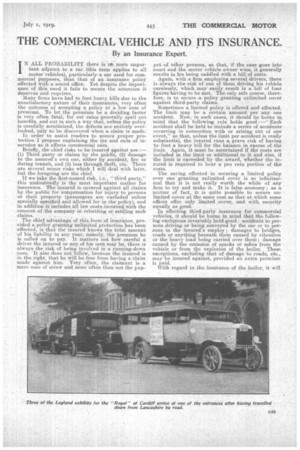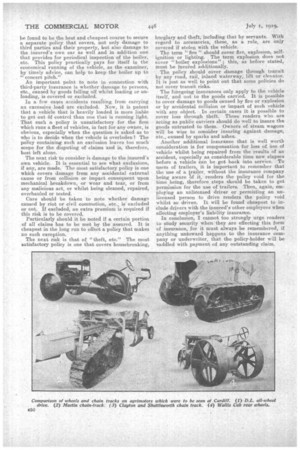THE COMMERCIAL VEHICLE AND ITS INSURANCE.
Page 19

Page 20

If you've noticed an error in this article please click here to report it so we can fix it.
By an Insurance Expert.
IN ALL PROBABILITY there is nt more important adjunct to a car. (this term applies to all motor vehicles), particularly a car used for commercial purposes, than that of an. insurance policy effected with a sound office. Yet despite the importance of this need it fails to secure the attention it deserves and requires.
Many firms have had to foot heavy bills due to the .unsatisfactory nature of their insurances, very often the outcome of accepting a policy at a low rate of
• premium. To let the premium be a deciding factor is very often fatal, for cut rates generally spell cut • benefits, and cut in such a way that, unless the policy is carefully scrutinized, the defects are entirely overlooked, only to be discovered when a claim is made.
In order to assist readers to secure proper protection I propose explaining the ins and outs of insurance as it effects commercial ears.
Briefly, the chief risks to be insured against are :— (1) Third party or claims by the public, (2) damage to the assured's own car, either by accident, fire or during transit, and (3) loss through theft, etc. There are several minor risks which I will deal with later, but the foregoing are the chief.
If we take the first-named risk, i.e., " third party," this undoubtedly is the most important matter for insurance. The insured is covered against all claims by the public for compensation for injury to persons or their property (passengers are excluded unless specially specified and allowed for in the policy), and in addition it includes.all law costs incurred. with the consent of the company in rebutting or settling such
claims. . ,
. The chief advantage of this form Of insurance, provided a policy granting Unlimited protection has been effected, is that the insured knows the-total amount of his liability in any year, namely, the Premium he is called on to pay. It matters not how careful a driver the insured or.any of his men may be, there is always the risk of being involved in a running-down case. It also does not follow, because the insured is in the right, that he will be freefrom having a 'claim made against him. Very often, the claimant is a mere man of straw and more often than not the pup pet of other persons, so that, if the, case goes into court and the motor vehicle owner wins, it generally results in his being saddled with a bill of costs.
Again, with a firm employing several drivers, there is always the risk of one of them driving his vehicle carelessly, which may easily result in a bill of four figures having to be met. The only safe course, therefore, is to secure a policy granting unlimited cover against third-party claims.
Sometimes a limited policy is offered and effected. The limit may be a certain amount per any one accident. Now, in such cases, it should be borne in mind that the following rule holds good :—" Each accident shall be held to include a series ci accidents occurring in connection with or arising ont of one event,' so that, unless the limit per accident is really substantial, the insured runs a grave risk of having to foot a heavy bill fox :the balance in excess of the limit. Again, it must be ascertained if the costs are included in the limit or additional to it and also, if the limit is exceeded by the award, whether the insured is required to bear a pro rata portion of the costs.
The saving effected in securing a limited policy over one granting unlimited cover is so infinitesimal that it is not really worth the while of any firm to try and make it. It is false -economy ; as a matter of fact_ it is quite possible to secure unlimited cover at the same cost as that at which some offices offer only limited cover, and with security equally as good. In effecting third-party insurance for commercial vehicles, it should be borne in mind that the following exclusions invariably hold good : accidents to persons .driving or being conveyed by the car or to persons in the insured's employ ; damages to bridges, roads or anything beneath them -caused by vibration or the heavy load being carried over them ; damage caused by the emission of sparks or ashes from the vehicle or from the explosion of the boiler. These exceptions, excluding that of damage to roads, etc., may beinsured against, provided an extra premium is paid.
With regard to the insurance of the boiler, it will
be found to be the best and cheapest course to secure a separate policy that covers, not only damage to third parties and their property, but also damage to the insured's own car as well and in addition one that provides for periodical inspection of the boiler, etc. This policy practically pays for itself in the economical running of the vehicle, as the examiner, by timely advice, can help to keep the boiler up to "concert pitch."
An important point to note in connection with third-party insurance is whether damage to persons, etc., caused by goods falling off whilst loading or unloading, is covered or excluded. In a few eases accidents resulling from carrying an excessive load are excluded. Now, it is patent that a vehicle that is heavily loaded is more liable to get out of control than one that is running light. That such a policy is unsatisfactory for the firm which runs a fleet of vehicles, in fact for any owner, is obvious, especially when the question is asked as to who is to decide when the vehicle is overladen? The policy containing such an exclusion leaves too much scope for the disputing of claims and is, therefore, best left alone.
The next risk to consider is damage to the insured's own vehicle. It is essential to see what exclusions, if any, are made. The most satisfactory policy is one which covers damage from any accidental external cause or from collision or impact consequent upon mechanical breakdown, or wear and tear, or from any malicious act, or whilst being cleaned, repaired, overhauled or tested.
Care should be taken to note whether damage caused by riot or civil commotion, etc., is excluded or not. If excluded, an extra premium is required if this risk is to be covered.
Particularly should it be noted if a certain portion of all claims has to be met by the assured. It is cheapest in the long run to effect a policy that makes no such exception.
The next risk is that of "theft, etc." The most satisfactory policy is one that covers housebreaking, burglary and theft including that by servants. With regard to accessories, these, as a rule, are only covered if stolen with the vehicle.
The term "fire " should cover fire, explosion, selfignition or lighting. The term explosion does not cover " boiler explosions" ; this, as before stated, must be insured additionally.
The policy should cover damage through transit by any road, rail, inland waterway, lift or elevator. It is just as well to point out that some policies do not cover transit risks.
The foregoing insurances only apply to the vehicle itself, and not to the goods carried. It is possible to cover damage to goods caused by fire or explosion or by accidental collision or impact of such vehicle with any object. In certain cases it is possible to cover loss through theft. Those readers who are acting as public carriers should do well to insure the goods entrusted to them. Owners of steam wagoni will be wise to consider insuring against damage, etc., caused by sparks and ashes.
Another additional insurance that is well worth consideration is for compensation for loss of use of vehicle whilst being repaired from the results of an accident, especially as considerable time now elapses before a. vehicle ean be got back into service. To users of trailers, it is important to remember that the use of a trailer, without the insurance company being aware of it, renders the policy void for the time being, therefore steps should be taken to get permission for the use of trailers. Then, again, employing an unlicensed driver or permitting an unlicensed person to drive renders the policy void whilst so driven. It will be found cheapest to include drivers with the insured's other employees when effecting employer's liability insurance.
In conclusion, I cannot too strongly urge readers to study security when they are effecting this form of insurance, for it must always be remembered, if anything untoward happens to the insurance company or underwriter, that the policy-holder will be saddled with payment of any outstanding claim.






















